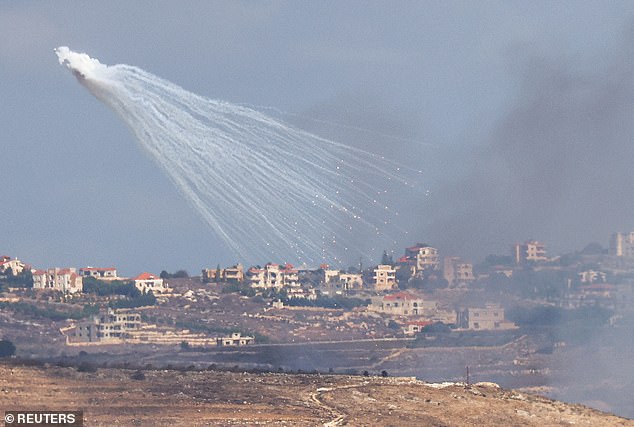Hezbollah unleashes 100 rockets into Israel as IDF calls up more troops and orders more Lebanese villages to evacuate as it continues invasion hours after Iranian missile barrage

Hezbollah has launched more than 100 rockets into Israel, with the group claiming it has targeted troops massing on the border as the Israeli Defence Forces ordered more troops and armoured units to join its ground invasion of Lebanon.
Hezbollah said this morning that its forces had confronted Israeli soldiers who were infiltrating the southern village of Adaisseh and forced them to retreat, claims Israel has not commented on.
The Iran-backed group also said that its fighters had targeted ‘a large infantry force’ in Misgav Am across the border with ‘rockets and artillery’, as well as troop gatherings in three other locations, one with Burkan short-range ballistic missiles.
The IDF said more than 100 rockets have been launched by Hezbollah into northern Israel, with alerts sounding out across towns near the border, as the shaken country continues to brace for attacks after last night’s barrage of missiles sent by Tehran.
With at least five huge strikes hitting Hezbollah’s stronghold in southern Beirut this morning and thousands warned to evacuate their homes, Lebanese civilians are fleeing north while Britons and other foreign nationals are rushing to escape the country.

Artillery is fired by the Israeli Army into Lebanon, amid cross-border hostilities between Hezbollah and Israel, as seen from Jish, northern Israel October 2, 2024

Firefighters work as smoke billows at the site of an overnight Israeli airstrike in Beirut’s southern suburb of Hadath area on October 2, 2024

An Israeli Apache helicopter releases flares near the Israeli-Lebanon border

A woman carries a cat past a destroyed building at the site of an overnight Israeli airstrike in Beirut’s southern suburb of Shayyah on October 2, 2024

Dust and smoke billow from the site of an overnight Israeli airstrike in Beirut’s southern suburb of Shayyah on October 2, 2024

Firefighters work as smoke billows at the site of an overnight Israeli airstrike in Beirut’s southern suburb of Hadath area on October 2, 2024

A man holds children as people take cover during an air raid siren in central Israel after Iran fired off a salvo of missiles on Tuesday night

A woman kisses her 10-month-old child as they shelter in a school after being displaced by Israeli airstrikes, on October 1, 2024 in Saida, Lebanon

A plane takes off at Beirut-Rafic Hariri International Airport as smoke rises over Beirut’s southern suburbs after a strike on October 2, 2024


Smoke rises from the Laylaki neighborhood of Dahieh after Israeli warplanes target the area, located south of the capital Beirut, on October 1

This picture shows projectiles being intercepted by Israel near the northern city of Baqa al-Gharbiya on October 1

Firefighters work as smoke billows at the site of an overnight Israeli airstrike in Beirut’s southern suburb of Hadath area on October 2, 2024
In a statement this morning, the IDF said ‘additional forces’ are joining ‘the limited, localized, targeted raids on Hezbollah targets’ in southern Lebanon.
It added that they would be drawn from a range of forces including the 36th Division, who were withdrawn from Gaza earlier this year, and would be joining the 98th division which is already in Lebanon.
As it steps up its campaign, Israel has warned people in southern Lebanon to leave their homes in southern Lebanon and evacuate to the north of the Awali River, some 36 miles from the border.
It is much further than the Litani River, which marks the northern edge of a UN-declared zone intended to serve as a buffer between Israel and Hezbollah after their 2006 war.
The border region has largely emptied out of the hundreds of thousands of people who live on both sides amid sustained cross-border fire over the past year.
Israeli strikes have killed over 1,000 people in Lebanon over the past two weeks, nearly a quarter of them women and children, according to the Health Ministry. Hundreds of thousands have fled their homes.
And Israeli strikes killed at least 32 people in southern Gaza overnight as the military launched ground operations in the hard-hit city of Khan Younis.
Israel has continued to strike what it says are militant targets across Gaza nearly a year after Hamas’ October 7 attack ignited the war, even as attention has shifted to Lebanon and growing tensions with Iran.

An Israeli mobile artillery unit fires a shell from the northern border towards Lebanon on Wednesday morning

Smoke rises from an Israeli airstrike in Choueifat, south of Beirut, Lebanon, October 2, 2024

Smoke rises over Beirut’s southern suburbs near Beirut-Rafic Hariri International Airport after a strike

A destroyed building lies on the ground after an Israeli airstrike in Beirut’s southern suburb of Shayyah on October 2, 2024
Israel has said it will continue to strike Hezbollah until it is safe for tens of thousands of its citizens displaced from homes near the Lebanon border to return.
Hezbollah has vowed to keep firing rockets into Israel until there is a cease-fire in Gaza with Hamas.
Late into the night, residents in Beirut were told to evacuate by the IDF, which said that their homes were within 500 metres of Hezbollah facilities that would be struck imminently.
Lebanese politician Michel Helou told the BBC that the situation is ‘tense’ in the country’s capital.

The bodies of the Palestinians killed in the Israeli attack on Deir al-Balah are brought to Al-Aqsa Martyrs Hospital for funeral and burial, in Gaza Strip on October 2, 2024

It was reported that there were dead and wounded, including babies, as a result of the Israeli army’s attack on Nuseirat Camp in the central part of Gaza
‘Last night none of us slept much because it was the fifth night in a row that the southern suburb is struck.
‘Every hour the Israeli army sends a Twitter post warning people to evacuate, but how and where and how could it be possible for them to evacuate in half an hour before a strike hits.
‘It’s very traumatising obviously psychologically, on top of the human toll of those strikes.’
People across the region remain on edge as the situation appears to be spiralling out of control, with fears that an all-out war appears increasingly inevitable.

There is panic across the region after Israel vowed to retaliate following Tehran’s missile bombardment last night.
Some 180 missiles began raining down on Israel on Tuesday night, with rockets dramatically exploding into bright orange flames near Tel Aviv as air raid sirens sounded.
The White House said Iran’s missile volley was ‘defeated and ineffective’, with just one reported death – a Palestinian man who was killed by shrapnel in the West Bank.
Still, the aerial assault forced civilians across Israel to seek shelter as huge chunks of molten metal crashed to the ground, and was ‘twice the scope’ of Tehran’s bombardment in April, which saw more than 170 explosive drones and 120 ballistic missiles launched.

People take shelter during an air raid siren after Iran fired a salvo of ballistic missiles

People take cover by the side of a road as a siren sounds and after Iran fired a salvo of ballistic missiles at Israel, in Tel Aviv, Israel, October 1, 2024

Members of Israel’s Home Front Command and police forces inspect a crater left by an exploded projectile at a heavily-damaged school building in Israel’s southern city of Gedera on October 1, 2024
In the wake of the attack, Iran’s Foreign Minister Abbas Araghchi said Tehran considers the matter ‘concluded… unless Israeli regime decides to invite further retaliation. In that scenario, our response will be stronger and more powerful.’
He also labelled the attack as ‘self-defence’ and noted that Iran had ‘exercised tremendous restraint’ after the assassination of Hamas leader Ismail Haniyeh in Tehran in July.
But Israeli sources told Axios all options were on the table for retaliation despite Iran’s threats – including targeting oil and even nuclear facilities.

Iranians burn an Israeli flag during a celebration after the IRGC attack on Israel, in Tehran, Iran, October 1, 2024

Iranian state TV broadcasted the moment it launched nearly 200 missiles towards Israel
Despite Iran claiming a new type of hypersonic missile was also used for the first time, IDF Rear Admiral Daniel Hagari said there were no Israeli casualties and just a few hits in the centre of the country and in the south.
‘We are on high alert both defensively and offensively,’ Hagari said in a TV broadcast.
‘We will defend the citizens of the State of Israel. This attack will have consequences. We have plans, and we will operate at the place and time we decide.’




